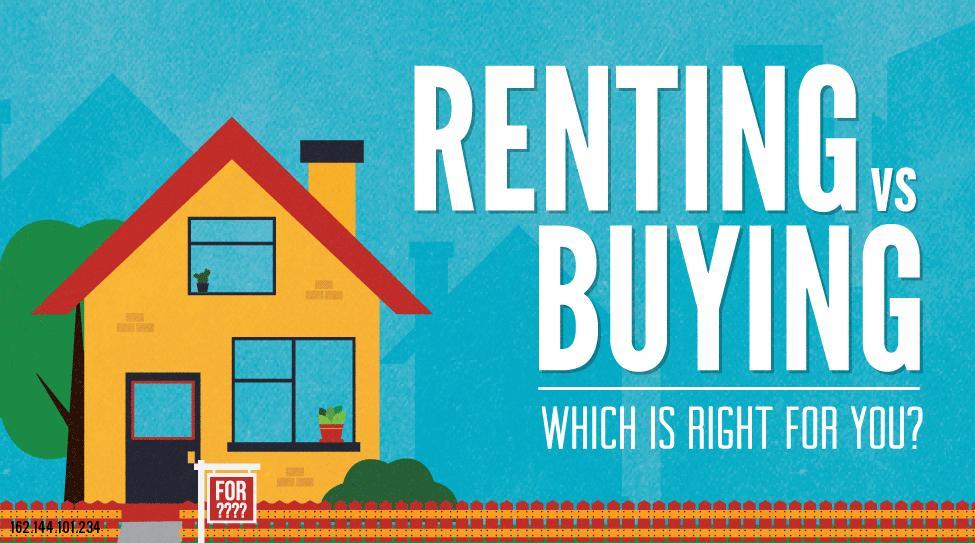Renting vs. Buying: What’s the Right Choice for You?

Deciding whether to rent or buy a home is one of the most significant financial decisions you'll make. Both options have their pros and cons, and the right choice depends on your personal circumstances, financial situation, and long-term goals. In this article, we'll explore the key factors to consider when deciding whether to rent or buy, helping you make an informed decision.
Financial Considerations
One of the primary factors in the rent vs. buy debate is the financial aspect. When you rent, your monthly payments typically go toward the property owner's mortgage, property maintenance, and profit. On the other hand, when you buy a home, your mortgage payments build equity in your property, which can be a valuable asset over time.
Renting: Renting usually requires a smaller initial financial commitment. You typically need to pay a security deposit and the first month’s rent upfront. Additionally, renting can be more predictable in terms of expenses, as you won’t be responsible for property maintenance or repairs. This makes renting an attractive option for those who need flexibility, such as young professionals or individuals who may move frequently.
Buying: Buying a home involves a more substantial upfront investment, including a down payment, closing costs, and other fees. However, the long-term financial benefits of homeownership can be significant. Over time, as you pay down your mortgage, you build equity in your home. This equity can increase in value if the property appreciates, providing a potential financial return on your investment. Additionally, owning a home can offer tax benefits, such as deductions on mortgage interest and property taxes.
Flexibility vs. Stability
Another critical factor to consider is your need for flexibility versus your desire for stability.
Renting: Renting offers flexibility that homeownership cannot match. If your job requires you to relocate frequently, or if you're unsure about where you want to settle long-term, renting allows you to move with minimal hassle. Lease agreements typically last a year, and you can often negotiate shorter terms. This flexibility can be particularly valuable for those who are still exploring different cities or neighborhoods.
Buying: Owning a home provides a sense of stability and permanence. If you’re ready to settle down in a particular area, buying a home can give you a sense of belonging and community. Homeownership also allows you to personalize your space, from making renovations to landscaping, without needing permission from a landlord. However, this stability comes with less flexibility, as selling a home can be time-consuming and costly, especially if you need to move quickly.
Market Conditions
The state of the real estate market can also influence your decision to rent or buy. In a buyer's market, where property prices are relatively low, buying a home can be a smart financial move. Conversely, in a seller's market, where prices are high and inventory is low, renting might be the more prudent choice.
Renting: In a hot real estate market, renting can offer a way to avoid overpaying for a home. It allows you to wait for better market conditions or save more money for a larger down payment. Additionally, renting can be advantageous in areas where property values are volatile, helping you avoid potential losses if the market declines.
Buying: In a stable or appreciating market, buying a home can be a sound investment. If property values are rising, purchasing a home allows you to benefit from that appreciation. However, it's essential to consider the long-term outlook of the market and ensure that you're financially prepared to weather any potential downturns.
Personal Lifestyle and Goals
Finally, your personal lifestyle and long-term goals should play a significant role in your decision.
Renting: If you value convenience, flexibility, and a maintenance-free lifestyle, renting might be the best option. It allows you to focus on your career, travel, or other priorities without the responsibilities of homeownership.
Buying: If you're looking to put down roots, build equity, and have the freedom to make a space your own, buying a home may align more with your long-term goals. Homeownership can be particularly rewarding if you plan to stay in one place for several years or more.
Conclusion
There’s no one-size-fits-all answer to the renting vs. buying question. The right choice depends on your financial situation, market conditions, lifestyle preferences, and long-term goals. By carefully considering these factors, you can make a decision that best suits your needs and sets you on the path to financial stability and personal satisfaction.




